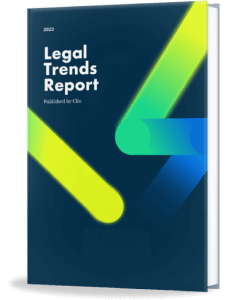In 2023, law grads have endless opportunities to land a legal position. However, while the American Bar Association (ABA) has identified a modest increase in the number of jobs for law school grads nationwide over the past two years, it’s important to ensure you’re putting your best foot forward to ensure you land the legal job of your dreams.
The best way to stand out is to build a legal resume that shows employers you have the necessary skills, experience, and academic background to fulfill their requirements and expectations. But it’s hard to build an outstanding legal resume when you don’t know where to start or what to include.
Legal resume templates are an important tool for lawyers just starting out in their careers or veteran attorneys looking to make a change. Using a template as your starting point helps ensure you include the right information to help your legal resume stand out to recruiters and firms.
What should be included in a legal resume?
When you’re looking for a legal resume template, it should include sections for:
- Contact information
- A professional summary
- Credentials
- Professional and academic experience
- Any publications or speaking credits under your name
- Potential pro bono or volunteer experience
- Relevant key skills.
Contact information
Include your full name, email, and phone number in the contact information section. Adding social media profiles such as LinkedIn or Twitter is also acceptable but not required. If you choose to add those profiles to your resume, ensure that they look professional and do not contain any inappropriate posts, photos, or comments.
Apply this level of professionalism to your email address as well. Use a personal email address that looks professional (if your email address looks like “ILoveDogs@email.com,” you might want to consider changing it to something more formal). If you’ve graduated from law school, your student email will likely be deactivated, so a personal email is more reliable.
Professional summary
A professional summary is a short, skimmable section of your resume. This section should be longer than two sentences but shorter than a paragraph. List your credentials, what practice area you’re interested in, and why you’re qualified for the position you are applying for.
Credentials
Outlining your credentials may seem obvious, but this is an often-overlooked section of a legal resume. This section should include your bar admission. The ABA has a few recommendations for formatting this section:
- Put Esq. after your name in the contact information section.
- “[Jurisdiction]: Bar Admission, Good Standing”: If you passed the bar exam.
- “Eligible for [month]/[year], [jurisdiction] bar exam”: If you haven’t yet applied to take the bar exam, but are eligible for it.
- “Candidate for [month]/[year], [jurisdiction] bar exam”: If you’ve submitted your application to sit for the exam but have not yet taken it.
- “Candidate for [month]/[year], [jurisdiction] bar exam (results pending)”: If you’ve sat for the exam but haven’t yet received the results.
- “[Jurisdiction], (bar admission pending)”: If you’ve passed the exam but not yet been sworn in.
- If you’ve been admitted, but are inactive for any reason, use your jurisdiction’s official language for your status.
Professional experience
This section of your legal resume is where you detail your past professional experience and show that you are qualified for the position you are applying for. Detail your previous positions in reverse chronological order, starting with the most recent one. Include the firm name, your position title, how long you worked there, and what your accomplishments were.
If you don’t yet have any relevant experience or achievements as a lawyer (you may be a new graduate, transitioning from another legal position like a paralegal, only had temp work, etc.), still include those positions in this section.
Even if this section turns out to be shorter than you like, showcase your accomplishments and be proud of the work that you’ve done.

Academic experience
Academic experience extends beyond the law school you went to. This section can also include any accomplishments that you had while in school, such as GPA, awards, organizations or notable research projects that you were a part of.
One thing to note is that you should only include your GPA if you graduated within three years of law school and it is above a 3.5. Otherwise, this information may reflect negatively on your application.
Publications and speaking credits
This section is to showcase any notable accomplishments you’ve had outside of your academic or professional experience. Perhaps you’ve been published in a legal journal or had a speaking credit at a legal conference. Both will help you stand out as a candidate for the position you’re applying for.
Pro bono and volunteer experience
While the ABA does not mandate pro bono service, they highly recommend under their ethical rules that lawyers contribute at least 50 hours of pro bono service per year.
Including this section in your resume can showcase your passion and expertise for a specific area of law or specialization, which will help you stand out as a candidate. This information will also help a potential employer see your commitment to helping a person(s) of limited means.
Key skills
Many firms have transitioned to a modern practice, thanks to the ABA’s duty of technology competence guidelines. Because of this, technical skills like working with a computer or understanding cloud-based legal practice management software have become more desirable.
Soft skills, such as being detail-oriented, easy to work with , and adaptable to changing situations are also important for being a successful lawyer.
If you’re struggling to fill out this section, many legal job postings will list the skills they require, such as strong organizational, communication, and interpersonal skills. If these apply to you, then it’s wise to include these in your resume.
Are legal resume templates free?
Yes, there are many free legal resume templates online that you can use. Better yet, if you are a recent law school graduate, your school’s career services center will likely have legal resume templates that you can use, in addition, to resume writing guidance.

Legal resume sample
First name, last name, Esq.
Phone number: XXX-XXX-XXXX
Email address: professionalemail@email.com
Professional summary:
A lawyer specializing in [practice area] with [number of years] years of experience [detailing experience]. [Highlight 1 or 2 career accomplishments]. [Highlight professional credentials]. Looking to leverage my experience and expertise as a [position applying for] at [firm applying for]
Credentials:
[Jurisdiction]: Bar Admission, Good Standing
Professional experience:
[Position name], [firm name]
[Time worked]
- Achievement #1
- Achievement #2
- Achievement #3
[Position name], [firm name]
[Time worked]
- Achievement #1
- Achievement #2
- Achievement #3
[Position name], [firm name]
[Time worked]
- Achievement #1
- Achievement #2
- Achievement #3
Academic experience:
Juris Doctor, [law school], [dates attended]
- Accomplishment #1
- Accomplishment #2
Bachelor of [degree], [school name], [dates attended]
- Accomplishment #1
- Accomplishment #2
Publications and speaking credits
- Accomplishment #1
- Accomplishment #2
Pro-bono and volunteer experience
- Accomplishment #1
- Accomplishment #2
Key skills
- Key skill #1
- Key skill #2
- Key skill #3
- Key skill #4
Final thoughts on legal resume templates
A legal resume template is a great tool to help you get started. But ultimately, a legal resume template is not the only way to create your resume. There may be sections that don’t apply or you may be applying for a position in a practice area that has different, more rigid requirements.
A legal resume template is a tool that you should use as a guiding point to move forward instead of a rigid structure you need to follow. Your legal resume is also a living document. So, as you progress in your career, you might decide to add or remove sections. All the sections listed above are customizable and include best practices to help you stand out from the competition.
Need more guidance? For more resources on legal templates, be sure to check out our legal document templates hub.


